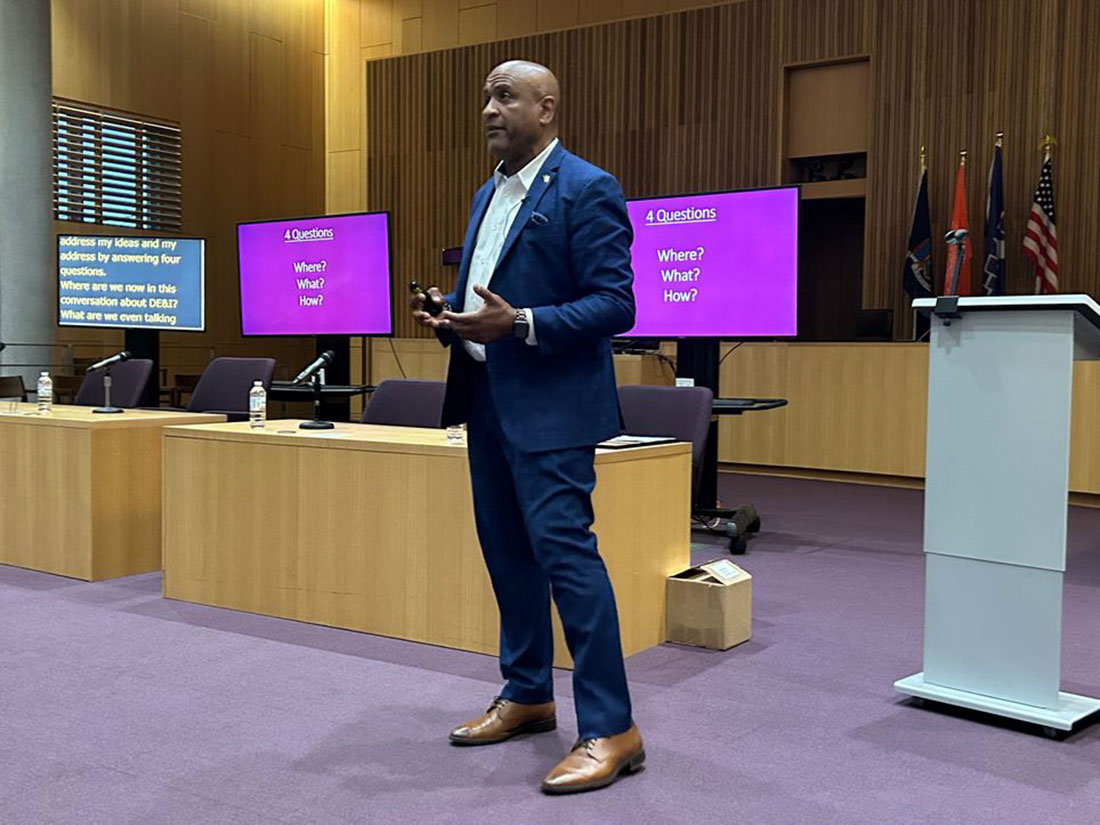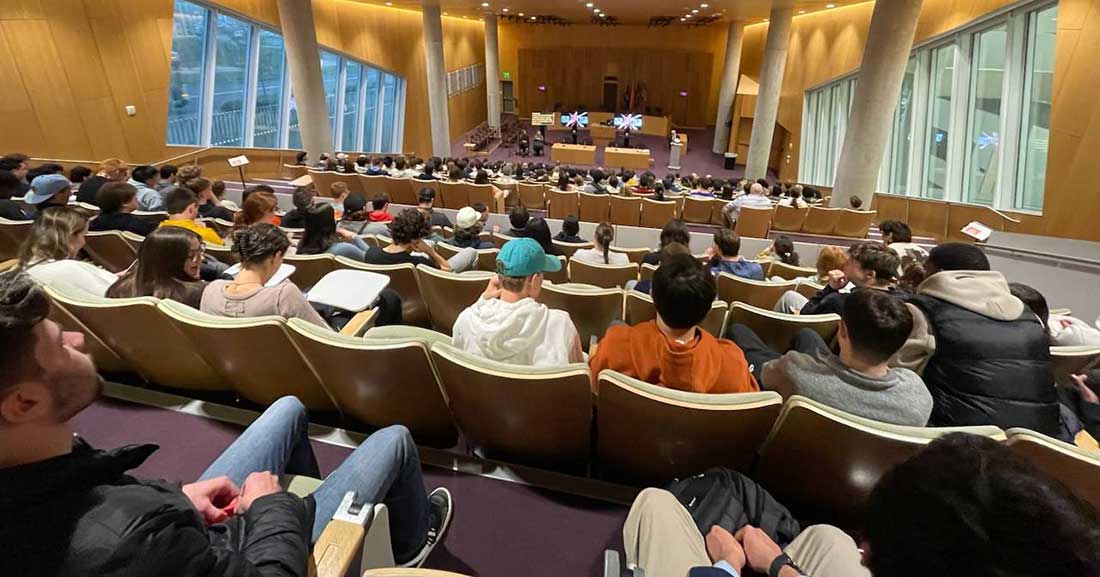
At the start of his keynote address at the Oct. 12 Jonathan B. Wanderstock “Diversity, Equity, Inclusion and Accessibility in Sport” lecture, Kevin Clayton had one request for the large gathering of students in attendance at the College of Law’s Dineen Hall.
“If nothing else, I want you to walk away with one new concept or tool that will help you on your journey to successful,” said Clayton, Senior Vice President and Head of Social Impact and Equity for the Rock Entertainment Group, which includes the NBA’s Cleveland Cavaliers.
It’s safe to say that the students–and everyone else who attended–walked away with more than one concept to consider and a far better understanding of what it means for an organization to practice what it preaches when it comes to diversity, equity, inclusion, and accessibility (DEIA).
Clayton explained that his job title is his “what,” but it’s a person’s “why” that has more impact because your why is your purpose. For Clayton and the Cavaliers, their “why” became clear after George Floyd, an African American man, was murdered by a Minnesota police officer in May 2020.
“It wasn’t until post-George Floyd that we knew our why: connect the platform of sports to social justice,” Clayton said. “We’re the only city where three sports teams (the Cavaliers, NFL’s Browns, and Major League Baseball’s Guardians) have met every two weeks for the past three years around issues for social justice. We focus on law enforcement, education, and voting/civic engagement, and for all three teams to be involved the impact is like 1+1+1 equals 100 and not 1+1+1 equals three.”
The “Diversity, Equity, Inclusion and Accessibility in Sport” Lecture Series is made possible through a generous gift to Falk College’s Department of Sport Management from alum Jonathan B. Wanderstock, who earned his undergraduate degree in public communications and management from Syracuse University and is a philanthropic advisor for the University of Colorado’s Anschutz Medical Campus.

“The establishment of the Sport Management DEIA symposium by Jonathan Wanderstock has impacted the lives of hundreds of students across campus, not only those attending the symposium, but from having our panelists attend eight classes as part of their supportive contributions,” said Michael Veley, director and chair of the Department of Sport Management.
“Our department stands in solidarity with our commitment to diversity, equity, inclusion, and accessibility as we focus on areas of awareness, training, and education,” Veley added. “We seek to use sport as a platform for social justice and social responsibility, while encouraging open, honest dialog, including those related to racism, privilege, and allyship.”
In addition to Clayton’s keynote address, the event featured a panel discussion moderated by Rockwell Brown Burton, Associate Dean for Inclusivity, Diversity, Equity and Accessibility at the Newhouse School of Public Communications. The panel included:
- Kwame Agyemang, George and Betty Blanda Endowed Professor in Sport Leadership and Director of the Future of Sport Institute at the University of Kentucky.
- Dom Cambareri, Volunteer Executive Director of Syracuse Challenger Baseball and Founder and Board Member of the Carrier Park Field of Dreams All-Inclusive Sports Park.
- Leashia Lewis, Assistant Athletic Director for Diversity, Equity, and Inclusion at Villanova University.
- Amy Reed, Head Women’s Basketball Coach and Diversity, Equity and Inclusion Athletics Director at Rochester Institute of Technology.
The panelists explained their roles in DEIA and social justice initiatives and answered questions from Brown Burton. After a Q&A with the students, Clayton and the panelists remained for one-on-one discussions with students.

He said it’s possible to have diversity but not inclusion unless you create a trusting environment in which all are included, respected, and supported. And equity, Clayton says, is building an “organizational landscape where all are empowered to be their authentic selves and contribute.”
At the end of the Q&A, Lewis–a Syracuse native who attended Villanova University–offered advice for students courtesy of a conversation she had with renowned political activist, author, and University of California professor Angela Davis, who notably once said, “I am no longer accepting the things I cannot change. I am changing the things I cannot accept.”
“I asked her, ‘What hope do we have?’” Lewis said. “She said, ‘Ask the youth; they are the future.’
“I came away from that meeting (with Davis) asking myself, ‘What am I going to do to help (students) be ready to fight for social justice?’” Lewis said. “So, I would say that we all have a role to play.”
